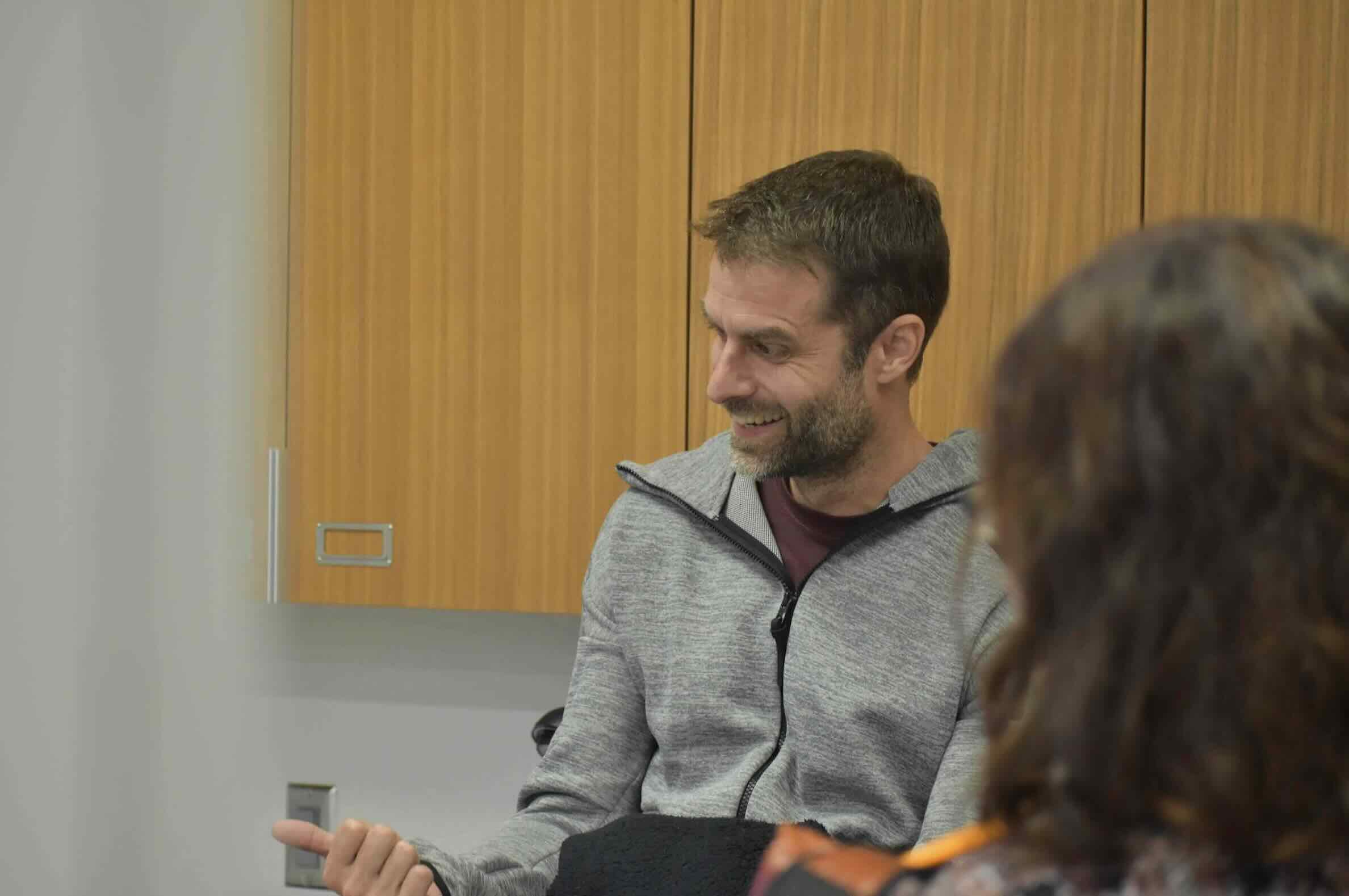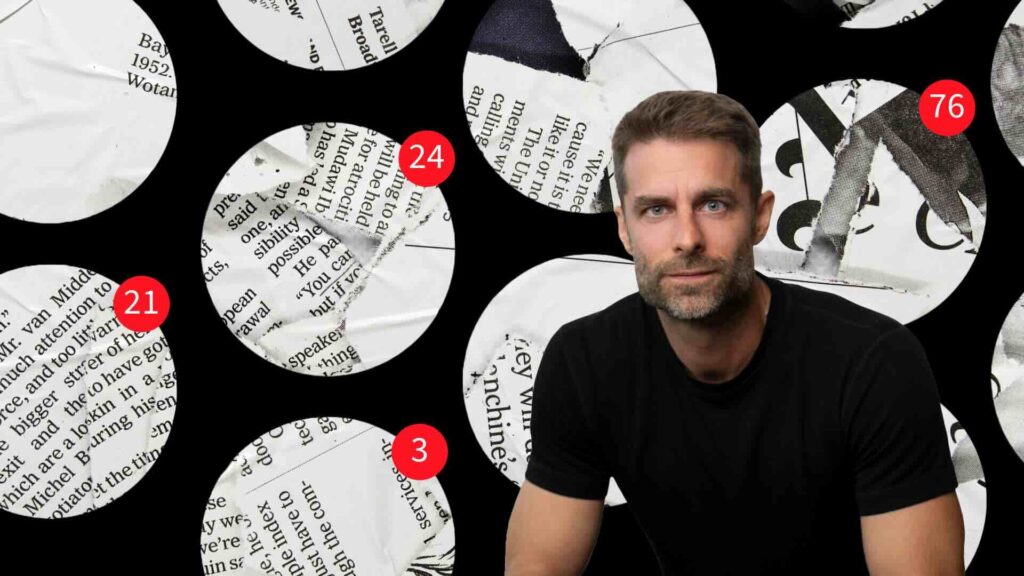The coronavirus pandemic has changed the way people think about science news. The global health crisis elicited a haze of misleading and deceptive information, which, enabled largely by social media, metastasized across the world wide web. A Gallup poll published in 2022 found that Americans’ trust in media is near its lowest point ever.
Kai Kupferschmidt, a contributing writer to Science Magazine, wants to understand this trend, and — just maybe — change its course.
For the past decade, Kupferschmidt has been reporting on how diseases spread. In 2018, he wrote a book about infections and plagues. Armed with a degree in molecular biomedicine from the University of Bonn, he has covered an mpox outbreak, the Ebola outbreak in West Africa, and, of course, Covid-19. Although he focuses primarily on biomedicine and public health, he has written on topics as diverse as artificial intelligence and the origin of the color blue.
Over that career, he’s witnessed how social media — and the personalities who populate it — can impact the public’s ability to distinguish facts from fiction. Now, as a 2023-24 Knight Science Journalism Fellow, Kupferschmidt is digging deeper into those issues. Last September, he spoke to me about his plans to use his time at MIT to tackle two of the great infections of the digital age: ignorance and misinformation. (The following interview has been lightly edited for length and clarity.)
Noah Daly: It sounds like you have an interesting mission for your time in Cambridge. What are you working on this year?
Kai Kupferschmidt: My experience during the pandemic showed me that misinformation and disinformation are crucial. I came out of the pandemic thinking if I want to do a good job of being an infectious disease reporter, I must be a misinformation and disinformation reporter as well. And that means learning a little bit more about the mechanisms that are at play. So the idea for the 10 months here is actually to work on that part of the equation. So I’ve been talking to misinformation, disinformation researchers. There’s Naomi Oreskes who does a class on basically destroying knowledge. I mean, this is a little bit more about people intentionally destroying knowledge, so it’s more disinformation than misinformation.
The thing that I’ve kind of decided I want to most focus on is actually trying to understand what we can teach people about how to navigate that information ecosystem…. If you had to design a curriculum right now, what are some fairly simple short-term fixes that we could teach people about how to decide whether something is true or not — how to investigate it?
If I give you 20 people who want to be better at understanding what they read every day, whether it’s true or not, what would you teach them?

ND: How do you see journalists changing the way they do their work in order to deal with misinformation? How has social media impacted that?
KK: What social media has done to some extent is to give individual journalists a platform personality. And that comes at the same time as legacy media, the big homepage, is becoming less important.
People will often come to articles through social media or a person they follow, so the personality of the journalist has become more of a thing. I’m really conflicted about that, but it’s an opportunity to build trust in a different way.
Jay Rosen likes to say, “there is no view from nowhere”, and the model of journalism has to some extent lived off the idea that we are gonna pretend there is, and that we get as close to it as we can.
I think social media does allow us to say, “these are my basic beliefs, and this is where I come from, and these are reasons why you should trust me or not”, and the same goes for scientists. We’ve learned that communicating science itself doesn’t necessarily make you trustworthy. [Scientists and journalists] must be upfront that their values inform how they do their work, and why.
But how much does this exacerbate the problem of echo chambers? People seek out information that adheres to their prior beliefs and follow the people that share them. That’s something [journalists are] still grappling with. Scientists, too. And then science journalists, being downstream of scientists, must grapple with how much they engage with conspiracy theories… When does something become big enough that you have to tackle it? And when are you giving something, oxygen that you shouldn’t? We’re always competing for attention, but it was different when you had one page in the newspaper that was the science page. Now, people won’t even get exposed to what you write unless it goes viral.
It’s a difficult needle to thread. Every single person with a cell phone in the world is essentially doing the job of journalists. We live in a journalism society now, but most people aren’t very good at it.
ND: How do you enter a community, look at the situation there, write about it, and maintain a journalistic voice that humanizes without looking down at those who might be suffering?
KK: There’re structural issues with how we do journalism (and with) our global network of contributors. I can’t say that I was aware of this when I started my job. I started in Berlin as a science journalist at a local newspaper, covering everything. The Ebola outbreak in West Africa was what changed things for me because I was doing my reporting based in Germany. And it became a problem: The people I had access to on the ground were almost all Western scientists who I had interviewed before on other topics. I found it very difficult to establish contact with any Liberian scientists and doctors who were busy managing a terrible crisis. That’s when I decided I wanted to go to Liberia. I was writing about a lot of White people doing things, and a lot of Black people having things done to them. I flew in there for 10 days, managed to make a few contacts, but still wrote in a way that I would try to avoid today. You need to get a lot of non-scientific context. One of the classes I’m taking here at Harvard is African popular culture. [Knowing more about culture] gives you access to having conversations with people that you can’t have if you are looking at everything from a microbiology perspective.
And there’s other places where I still don’t have any context, and I might still have to go there and report. On a basic level, we must broaden our idea of what expertise means, and gain access to different experts that inform our writing. You can’t write about global health if you don’t think about structural issues of equity, of racism. That’s a huge part of the story. We must also expand who gets to write these stories. The obvious solution is often going to be to collaborate with local journalists on the ground.
The world around us changes, and so we have to keep gaining new expertise. It’s one of the things that makes our job amazing: it never stops. You keep learning, and you have access to the people who can teach you. That’s an incredible gift.
Noah Daly is a student in the MIT Graduate Program in Science Writing.





A Great experience